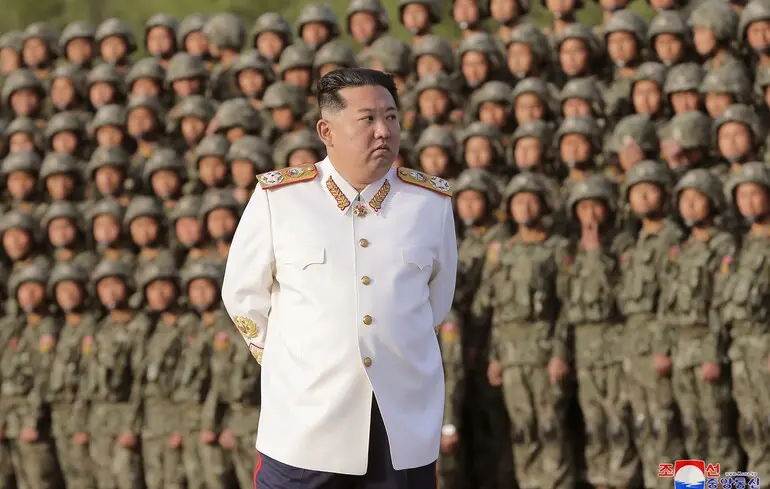Kim Jong Un’s Soldiers in the Steppes of Ukraine

The Russian-Ukrainian war is gradually transforming into what is so frightening for the US and the EU: a global conflict.
Although Kim Song, North Korea's representative to the UN, called the information about sending North Korean military to help the Kremlin in the war against Ukraine “groundless rumors,” there is more and more video evidence of the presence of Kim Jong Un's foot soldiers on Russian territory. OSINT-researchers have identified the filming location as the Sergeevskiy training ground in Primorskiy Kray, Russia.
Other facts also indirectly confirm the presence of North Korean servicemen in Russia. The Center for Strategic Communications has at its disposal a questionnaire prepared in Russian and Korean to facilitate the outfitting of soldiers from the DPRK with Russian army uniforms. In it, the servicemen are required to specify the required size of headgear, clothing and shoes.
According to Volodymyr Zelenskyy’s words, Ukraine has already detected military personnel from the DPRK in the occupied territories. In early October, it became known that as a result of one of the Ukrainian strikes on the occupied territory of the Donetsk region, six officers from North Korea were killed along with a group of Russian military, and three more were injured. The Guardian, citing an unnamed Ukrainian official, wrote that military engineers from North Korea were taking part in the fighting, helping the Russians to strike Ukrainian positions with North Korean KN-23 missiles.
The South Korean TV channel Chosun, quoting a South Korean government report, said that the DPRK sent its fighter pilots to an air base in Vladivostok, Russia in September. They can fly the Su-25s and MiG-29s that Moscow is using in its war against Ukraine. The pilots arrived there even before the ground contingent did. The authors of the report suggest that the sending of pilots from North Korea may be related to both training on Russian fighter jets and their participation in the war against Ukraine.
Amid the information about the arrival of military personnel from North Korea to Russia, Putin introduced a bill to the State Duma to ratify the treaty on comprehensive strategic partnership between Russia and North Korea. It states that if either side “is subjected to an armed attack by any state or several states and thus finds itself in a state of war,” the other will “immediately” provide military assistance.
An apologist for war with the West and Ukraine, Eurasianist Alexander Dugin reacted to the news of soldiers from North Korea with a pompous post on his Telegram channel: “The participation of Korean heroic fighters in the battle for Ukraine is wonderful. It is a gesture of deep solidarity with our war against Western hegemony. I would like to see hundreds of thousands of heroic Iranians and a million Chinese in our ranks, building a multipolar world and destroying the unipolar one in practice.”
According to ZN.UA, there are already 11,800 North Korean troops on Russian soil. And these are well-trained infantry. According to Kyrylo Budanov, head of the Defense Ministry's Main Intelligence Directorate, soldiers from the DPRK will be ready to participate in combat operations from November 1. He later said that 2,600 North Korean soldiers would be transferred to the Kursk region by the end of October. ZN.UA sources in the Ukrainian defense ministry suggest that the presence of the DPRK military will not have a significant impact on the theater of military operations in Donbas, but may change the situation in the Kursk region.
Experts note that soldiers from the DPRK may face serious problems when carrying out combat missions in Ukraine. First, the language barrier is likely to make it very difficult for North Korean and Russian units to coordinate their actions. Second, the lack of combat experience may have an impact. But do not underestimate the combat potential of the North Koreans. Mr. Budanov believes they will be motivated because they have families back home who could be executed if things go sour.
Kim sending soldiers to Russia gives Putin additional resources to press on. Previously, Pyongyang only supplied Moscow with shells and ballistic missiles. Despite their poor quality, they quench the Russian army's shell hunger. By engaging North Korean soldiers in combat, however, Putin is not only partially solving the problem of replenishing his thinning brigades by minimizing domestic mobilization, but also upping the ante in the war with Ukraine and the confrontation with the West by exporting tensions to the Far East.
Putin has also shown a willingness to transgress nuclear proliferation restrictions in order to win the war and gain control over Ukraine. Sources assure ZN.UA that the payment to Kim Jong Un for the North Korean contingent was not only money, but also Putin's transfer of submarine-launched nuclear missile technology and small nuclear explosives. This is far more significant to Kim-the-grandson than the opportunity for his army to gain combat experience in modern warfare.
Andrey Lankov, an authoritative Russian specialist in Korea affairs and professor at Seoul's Kookmin University, believes that the more Russia depends on North Korean military forces, the more likely it is that advanced Russian military technology will be transferred to North Korea. According to Lankov, Russia is unlikely to share significant amounts of military technology at the current stage, but with the protracted conflict and deteriorating economic situation, this possibility becomes more realistic.
After Russia raised the stakes and North Korea entered the war, it is important for Ukraine and the world how the US, EU and South Korea will respond: will they increase arms deliveries to our country or will they once again show concern?
Unfortunately, our partners have no levers to prevent Kim Jong Un from sending soldiers to war in Ukraine: back in the day, Washington could not achieve the termination of Pyongyang's nuclear weapons and ballistic missile development programs. Sanctions and export restrictions are virtually of no use against North Korea. It is indicative that the North Korean KN-23/24 missile shot down in Ukraine contained Western-made components.
To stop the growing military-technical cooperation between Russia and the DPRK, the US must escalate the conflict further. This could include both supplying Ukraine with long-range weapons and authorizing their use deep into Russian territory, as well as sending American or European instructors into our country and stationing units on the Ukrainian-Belarusian border or western Ukraine. However, the Biden administration is not yet ready to decide on the transfer of long-range weapons to us.
In Europe, on the other hand, information about DPRK units revives talk of sending soldiers from EU member states to Ukraine. “If the information that Russian killing squads are reinforced with North Korean ammunition and military personnel is confirmed, we should go back to 'boots on the ground' and other ideas proposed by Macron,” Lithuanian Foreign Minister Gabrielius Landsbergis told Politico. Such units could reduce the burden on the Ukrainian army. But will European leaders have the resolve?
The only one who now has a real tool to influence Moscow and Pyongyang is Beijing: both Russia and North Korea are economically dependent on China. There are speculations that the sending of North Korean soldiers to Russia took place with China's knowledge. It is alleged that Beijing, by expanding the conflict zone, is signaling that it wants to negotiate with Washington.
Moscow's transfer of nuclear technology to Pyongyang threatens South Korea's security and forces Seoul to take retaliatory action, rather than limiting itself to summoning the Russian ambassador to the Foreign Ministry. South Korea is discussing the deployment of its experts and intelligence officers to Ukraine to participate in the interrogation of captured North Koreans and provide information on DPRK military tactics, as well as the possibility of supporting Kyiv with weapons. However, it is still too early to talk about revision of the arms supply policy: Seoul will respond to the military cooperation between Russia and the DPRK in a step-by-step manner.
South Korea refrained from exporting arms to Ukraine and from selling us ammunition not directly but through third countries, limiting itself to humanitarian aid shipments. The reason for the cautious stance was the desire to preserve trade relations with Russia and the fear that support for Kyiv would push Moscow toward a closer partnership with Pyongyang. However, Russian-North Korean cooperation in the context of the Russian-Ukrainian war has its own logic. And it should become a lesson not only for South Korea but also for Israel: Moscow will not pay attention to Tel Aviv’s interests if they contradict the Kremlin’s goals.
Washington, which after several days of silence did confirm the presence of North Korean soldiers in Russia, continues to take a cautious stance. Perhaps the White House will decide how to respond after the presidential election. But the inaction of the United States is another fact that demonstrates its loss of global leadership. And this provokes China, Russia, Iran and North Korea to use force and hybrid means to achieve their goals: they feel impunity.
Read this article in Ukrainian and russian.
Please select it with the mouse and press Ctrl+Enter or Submit a bug











 Login with Google
Login with Google